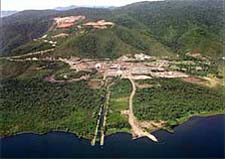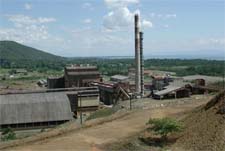 |
 |
| Skye Resources/HudBay Inc. images |
In April, Indigenous Notes reported that turbulent credit markets had forced Canadian mining company Skye Resources to temporarily suspend development of its Fénix nickel mine in El Estor, Guatemala (http://www.indianlaw.org/enews/april08/skye). Unfortunately, a recent merger between Skye Resources and HudBay Minerals Inc. means plans to bring the 31-year-old mine back online are moving forward again.
Skye CEO Colin Benner said the "...agreement merges the world class ferronickel Fénix project with a company with the financial and technical capacity to move it forward rapidly." Based on current production schedules, production of nickel would begin during the first months of 2009, and the mine would reach full production capacity by 2012. The estimated life of the mine is 30 years.
Allen Palmiere, President and CEO of HudBay, said "Our balance sheet strength and cash flows place us in an excellent position to bring the Fénix Project into production..."
In a presentation aimed at investors, HudBay said the Fenix operation will be one of the lowest-operating-cost nickel producers. It states there are additional resources beyond the 30-year mine life, considerable exploration potential, and it touts opportunities for growth.
MAYA Q'EQCHI' OPPOSITION
What they fail to warn investors about is the fact that much of the nickel lies beneath lands that do not belong to the company. The Guatemalan government granted the mining concession on lands that include those possessed by 17 Maya Q'eqchi' communities.
All of the Maya Q'eqchi' communities are staunchly opposed to the mine. The conflict has turned violent at times, (http://www.indianlaw.org/enews/april08/nickelmining) and we fear more Q'eqchi' may be evicted from their homes and prevented from practicing their subsistence farming and traditional way of life.
Guatemala's granting of the mining license without consultation is a clear breach of Convention 169 of the International Labour Organization, an international treaty with the force of law behind it. The Indian Law Resource Center believes the argument must be taken much further, that consultations must not be a substitute for indigenous peoples' human rights - their rights to land, resources, protections against relocations, protections against environmental degradation and pollution.
The Center is working to insist the Guatemalan government begin recognizing the collective property rights of the Maya Q'eqchi' to their land, territory, and natural resources. The Center is currently coordinating with Defensoria Q'eqchi' to exhaust the fight in domestic courts before filing a petition within the Inter-American Court system.
